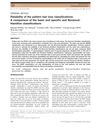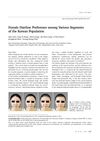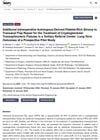 74 citations,
July 1979 in “Lancet”
74 citations,
July 1979 in “Lancet” Biotin treatment can significantly improve hair loss and motor functions in certain metabolic disorders.
56 citations,
September 2010 in “Veterinary pathology” Certain mouse strains develop a skin condition similar to a human hair loss disease due to genetic defects.
[object Object]  52 citations,
January 2001 in “Eye”
52 citations,
January 2001 in “Eye” Treating cystoid macular oedema in uveitis is difficult and risky.
30 citations,
January 2015 in “Dermatology” 308-nm excimer laser therapy helps regrow hair in alopecia areata.
26 citations,
June 2020 in “The Journal of Allergy and Clinical Immunology In Practice” A patient developed a severe skin reaction and died after taking hydroxychloroquine for COVID-19.
 25 citations,
November 2022 in “British journal of dermatology/British journal of dermatology, Supplement”
25 citations,
November 2022 in “British journal of dermatology/British journal of dermatology, Supplement” Baricitinib for severe alopecia areata is generally safe, with common side effects like infections and acne, and low rates of serious complications.
23 citations,
November 2018 in “International Journal of Molecular Sciences” Deoxyshikonin helps wounds heal faster in diabetic mice.
 20 citations,
January 2013 in “Annals of Dermatology”
20 citations,
January 2013 in “Annals of Dermatology” Topical minoxidil successfully treated temporal triangular alopecia.
 19 citations,
January 2016 in “Annals of Dermatology”
19 citations,
January 2016 in “Annals of Dermatology” Dutasteride is safe and effective for treating hair loss, but may decrease libido.
 18 citations,
July 2011 in “Journal of The American Academy of Dermatology”
18 citations,
July 2011 in “Journal of The American Academy of Dermatology” Familial factors affect hair loss types in Koreans, with M type in men, L type in women, and paternal factors influencing male hair loss more.
 16 citations,
November 2013 in “European Journal of Dermatology”
16 citations,
November 2013 in “European Journal of Dermatology” Hair gets thinner and grayer with age, and density decreases more in men on top and in women on top and back.
 16 citations,
October 2012 in “The Journal of Dermatology”
16 citations,
October 2012 in “The Journal of Dermatology” The BASP classification is more reliable than the Norwood-Hamilton for classifying hair loss in men and women.
[object Object]  14 citations,
July 2021 in “Biomolecules”
14 citations,
July 2021 in “Biomolecules” Centipeda minima extract helps hair grow by activating important growth signals and could be a promising hair loss treatment.
 14 citations,
July 2019 in “Experimental and Molecular Medicine”
14 citations,
July 2019 in “Experimental and Molecular Medicine” Nanog gene boosts stem cells, helps hair growth, and may treat hair loss.
 11 citations,
April 2018 in “Journal of Dermatology”
11 citations,
April 2018 in “Journal of Dermatology” Dutasteride safely treats hair loss without harming sexual function.
 11 citations,
April 2013 in “Journal of Agricultural and Food Chemistry”
11 citations,
April 2013 in “Journal of Agricultural and Food Chemistry” Monascus helps prevent baldness, prostate issues, and may be a natural alternative to medications.
 8 citations,
October 2018 in “Journal of Investigative Dermatology”
8 citations,
October 2018 in “Journal of Investigative Dermatology” Many patients with Alopecia Areata in Korea experience anxiety, depression, and reduced quality of life, which are often unrelated to the severity of hair loss.
 8 citations,
January 2013 in “Journal of The Korean Medical Association”
8 citations,
January 2013 in “Journal of The Korean Medical Association” Korean hair is typically thicker with a slower growth rate, and treatments like Dutasteride are effective for male pattern hair loss without major side effects.
 5 citations,
January 2021 in “Veterinary dermatology”
5 citations,
January 2021 in “Veterinary dermatology” Low-level laser therapy did not reduce licking or improve lesions in dogs with ALD but did increase hair growth.
 5 citations,
January 2020 in “Journal of Dermatology”
5 citations,
January 2020 in “Journal of Dermatology” Temporal hair loss relates to overall scalp hair loss in women.
 5 citations,
March 2017 in “Journal of Dermatology”
5 citations,
March 2017 in “Journal of Dermatology” Patients and doctors find current hair loss treatments unsatisfying and believe involving patients in decisions improves results.
2 citations,
September 2013 in “Journal of Veterinary Internal Medicine” Sweat hypersensitivity can cause severe skin issues in horses.
2 citations,
March 2009 in “Journal of Clinical Dermatology” 1 citations,
January 2022 in “Annals of Dermatology” Dutasteride is more effective than finasteride for long-term hair growth in men with androgenic alopecia.
 1 citations,
January 2014 in “Annals of Dermatology”
1 citations,
January 2014 in “Annals of Dermatology” Korean people prefer M-shaped hairlines and lower foreheads, with no major differences across various demographics.
 1 citations,
January 2002 in “Journal of Clinical Dermatology”
1 citations,
January 2002 in “Journal of Clinical Dermatology” Low iron levels in the blood may be linked to chronic hair loss in women.
 January 2025 in “Bioengineering”
January 2025 in “Bioengineering” Combining PRS with TAFR is promising for treating complex fistulas, with most patients achieving long-term healing.
 January 2024 in “Annals of Dermatology”
January 2024 in “Annals of Dermatology” Female pattern hair loss greatly affects women's quality of life, causing mild depression and anxiety, and increases medical expenses.
 March 2022 in “Women's health issues”
March 2022 in “Women's health issues” The conclusion is that women are heavily affected by autoimmune skin diseases, face significant challenges, and need better research, treatments, and healthcare policies.
February 2022 in “Veterinary record case reports” Light therapy successfully treated a dog's hair growth problem without side effects.






















